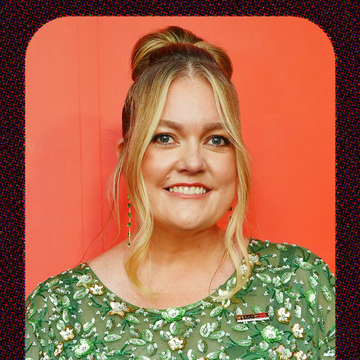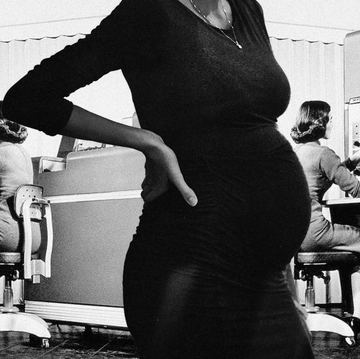The first time I heard the phrase “lesbian bed death,” I was in college, around the same time I started getting into queer relationships. It was a knowing, slightly tongue-in-cheek phrase that queer women wove into conversation—given as the reason so-and-so broke up after two years or the threat of what would happen if you started spending all of your time with your girlfriend and no one else. A lesbian bogeyman, so to speak, which would come for us all eventually.
If you’ve never heard the term, it refers to the idea that lesbian women in committed relationships will simply cease having sex after some period of time. They will become hopelessly enmeshed, too busy watching MUBI and snuggling or assembling furniture to want to do it. Popular therapist and author Esther Perel has suggested that emotional intimacy kills desire and, if stereotypes are to be believed, queer women love nothing more than to communicate every micro-ripple of their feelings. Cue the bedroom Grim Reaper.
To understand where this concept comes from, we have to rewind to 1983. In the landmark book American Couples: Money, Work, Sex, social psychologist Philip Blumstein, PhD, and sociologist Pepper Schwartz, PhD, both renowned in their fields, presented 12,000 U.S. couples—including 788 lesbian couples—with a questionnaire about their current relationships. The study found that women in committed queer relationships reported lower numbers when asked how often they had “sexual relations,” in comparison to other couples. They also generally had less sex the longer the relationship lasted. Schwartz dubbed this “lesbian bed death” and the term stuck.
These findings have come under fire in various ways since the book’s publication. For starters, the study is now more than four decades old, and astonishingly, there has been little substantial research on queer women’s sex lives since. Naturally, the definition of “sexual relations” also differs from couple to couple. For straight people, sex might mean penetrative sex. For queers, the definition might encompass a broader range of acts (a lot of straight people don’t consider oral sex alone as ‘full sex’, for example). The study also didn’t take sexual satisfaction or pleasure into account. Notably, recent research that is available has found that lesbians orgasm more often during sex than straight women and that queer women are having longer sex sessions than other kinds of couples.
Still, the LBD myth exerts a psychic weight on many queer women today, indicating that it has become its own kind of folklore. One quick glance at Reddit, for example, and you’ll still come across queers freaking out about a lack of bedroom action.
Some lesbian couples I spoke to for this piece told me that, over time, the term has become a self-fulfilling prophecy. Having less sex over the course of a long-term relationship felt like a “thing” as opposed to a relatively common occurrence among couples of any sexuality. “There’s something about the phrase that ‘others’ you in your own relationship,” says Gab, 26, over email. “Like, not only are we queer, but now we have to worry about this too. In the process of pathologizing a normal change within a relationship, you add more shame and punishment, which reaffirms a lot of the internal homophobia that’s probably already going on.”
Freya, 26, Gab’s partner of one year, says that it was something they worried about even before getting into a relationship, looming like an invisible specter. “When we first got together, I used to think of it jokingly but also worry about it.” Straight couples go through dry spells, Freya points out, but it doesn’t get its own fatalistic term. “Straight couples talk about the ‘spark’ dying and mean the evolution of a relationship into one that has less sex over time. But that phrase is so much softer. ‘Lesbian bed death’ literally sounds like a Victorian disease that you could succumb to at any moment.”
Part of the term’s endurance may be because society still can’t fully envision women experiencing sexual pleasure without men. “It comes from a centuries-old combination of misogyny and homophobia in which women aren’t seen as enjoying sex without procreation, and unfortunately that hasn’t disappeared overnight,” says Polly, 28, who has been with her partner for five years. Gab makes a similar point: “It’s attached to the desexualization of queer women—specifically, women without men. How can women continue to successfully have sex without men? They can’t! = Lesbian bed death.”
There’s also the nagging, ancient stereotype that women in general aren’t inherently sexual—a perception even straight women confront, as evidenced by the image of the low-libido wife batting away her husband’s advances. So how could two women possibly keep up the “farce” of being sexual together? “The dreaded stereotype of ‘bed death’ is an idea that has been ingrained by a society who failed to recognize lesbian and queer relationships as sexual ones,” said Jordan Dixon, a queer psychotherapist and couples therapist. She believes the term “lesbian bed death” is the product of that very distinct lesbophobia that exhibits itself subtly within the queer community.
Dixon also points out that any broad generalizations about queer women’s sex lives ought to be taken with a pinch of salt anyway, simply because many queer couples still keep their sex lives under wraps. Most of us don’t chat about sex in the same casual or open way that straight people can. “Simply existing as a woman within a societal system influenced by patriarchal structures of heteronormativity requires female couples to continuously consider the degree to which they will be open about their relationship with others,” she says.
The term, with its tinge of catastrophe, follows a societal pattern of using language as a form of subjugating queer women, said Amanda Pasciucco, a clinical sex and couples therapist. “We have a dominant model of culture that has been passed down for generations, which unfortunately is made up of using violent, aggressive and indirect language instead of nuance to express our problems,” Pasciucco explains.
Although LBD is still peddled among lots of lesbians, not everyone necessarily views it as a derogatory or subjugating phrase. Grace, 26, thinks the term rings true for some folk, and for her, it’s actually been a useful way of naming an issue. “I’ve been with my girlfriend for nearly 7 years and it’s definitely been easy to fall into [having less sex]. We have to actively work to stop the whole ‘lesbian bed death thing’ happening,” she says. “A lot of long-term lesbian relationships do go through a dry spell and people want to attach a name to it.”
Of course, having an active sex life within a long-term lesbian or WLW relationship is also perfectly normal, as plenty of queers (myself included) can attest to.
For those who worry about LBD affecting their own relationship, either now or in the future, Pasciucco says it’s worth asking yourself whether the term is useful, and if not, maybe consider throwing it out. “Like any negative thought or belief, I ask my clients if that belief helps them have the life they want,” she says. “I ask them to check in with their core values (for example: pleasure) and ask if the negative belief of LBD is helping them get the life they desire according to their core values.”
The LBD myth hasn’t died out quite yet. But maybe, with a little more interrogation inside and outside the queer community, we can finally put it to bed.
Daisy Jones is a writer, editor, and author of All The Things She Said. Her work has appeared in VICE, British Vogue, Rolling Stone, and the Guardian among others.













